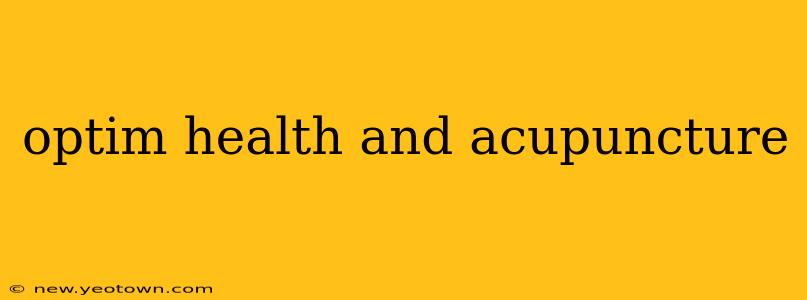Acupuncture, a cornerstone of Traditional Chinese Medicine (TCM), has garnered significant attention for its potential to improve overall well-being. But what exactly is it, and how can it help optimize your health? Let's delve into the fascinating world of acupuncture and explore its numerous applications.
What is Acupuncture?
Imagine tiny needles, thinner than a hair, gently inserted into specific points on your body. These aren't the painful needles of a doctor's office; rather, they're strategically placed to stimulate energy flow, often referred to as Qi (pronounced "chee") in TCM. This energy, according to TCM, flows through pathways called meridians throughout the body. When this flow is disrupted, imbalances occur, potentially leading to various health issues. Acupuncture aims to restore this balance, promoting healing and well-being. It's not just about sticking needles; it's a deeply holistic practice that considers your entire physical and emotional state.
How Does Acupuncture Optimize Health?
Acupuncture's mechanisms are complex and still being researched, but evidence suggests it works on multiple levels. The stimulation of acupuncture points triggers the release of endorphins, natural pain relievers. It can also influence the nervous system, modulating pain signals and reducing inflammation. Furthermore, it's believed to impact the endocrine system, helping regulate hormones and improve overall body function. This multifaceted approach is what makes acupuncture so effective for a wide range of conditions.
Does Acupuncture Treat Specific Conditions?
Yes, acupuncture is often used to treat a variety of conditions. Many find relief from chronic pain, such as back pain, neck pain, and headaches. It can also help with stress management, anxiety, and insomnia. Furthermore, some studies suggest it may be beneficial for digestive issues, fertility problems, and even certain autoimmune diseases. However, it’s crucial to remember that acupuncture should be considered a complementary therapy, and not a replacement for conventional medical treatment.
What are the Benefits of Acupuncture?
The benefits extend beyond the alleviation of specific symptoms. Many people report an overall sense of improved well-being, increased energy levels, and better sleep quality. It can also support the body's natural healing processes, enabling it to function optimally. The gentle nature of the treatment makes it suitable for people of all ages, and many find the experience deeply relaxing.
Is Acupuncture Safe?
When administered by a licensed and experienced practitioner, acupuncture is generally considered safe. However, as with any medical procedure, there are potential risks, including minor bleeding, bruising, or infection at the needle insertion sites. It's crucial to choose a qualified acupuncturist who is properly trained and licensed. Always inform your acupuncturist about your medical history, including any medications you're taking.
How Many Acupuncture Sessions Do I Need?
The number of sessions required varies depending on the individual and the condition being treated. Some people experience relief after just a few sessions, while others may require a longer course of treatment. Your acupuncturist will work with you to develop a personalized treatment plan based on your specific needs and goals.
How Much Does Acupuncture Cost?
The cost of acupuncture varies depending on the location, the practitioner's experience, and the length of the session. It's best to contact local practitioners directly to inquire about their fees.
What Should I Expect During My First Acupuncture Session?
During your first session, your acupuncturist will conduct a thorough health assessment, discussing your medical history, symptoms, and overall health goals. They will then develop a personalized treatment plan and begin the acupuncture treatment. The needles are inserted and left in place for a period of time, usually 20-30 minutes. Most people find the experience relaxing and pain-free.
In conclusion, acupuncture offers a holistic approach to optimizing health and well-being. By addressing imbalances in the body's energy flow, it can help alleviate a wide range of symptoms and promote overall wellness. However, it's important to consult with a licensed professional and integrate it with conventional medical care for the best possible outcomes. Remember, this information is for educational purposes and shouldn't replace professional medical advice. Always consult with your doctor or a qualified healthcare provider before starting any new treatment.

